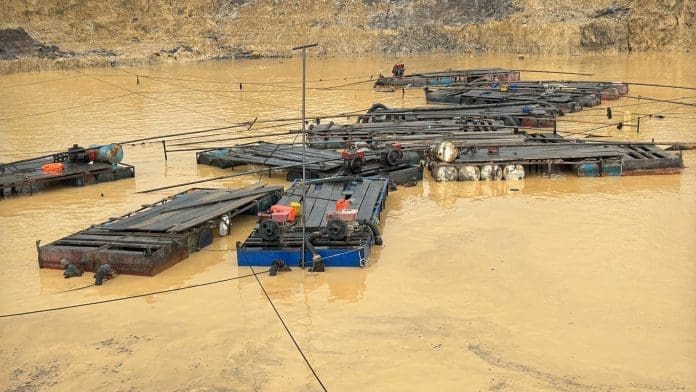Ghana Water Limited Managing Director Adam Mutawakilu has painted a stark picture of the country’s water future, warning that continuing illegal mining threatens to cascade economic costs across industries and push the nation toward severe supply shortages.
Speaking at a press conference in Accra on Monday, October 20, Mutawakilu described the rapid siltation of major water bodies as a crisis extending far beyond his company’s operations. His warnings came as Ghana Water Limited seeks GH₵300 million to undertake emergency desilting across treatment plants nationwide, excluding the heavily damaged Barekese Dam which requires separate large-scale intervention.
The scale of the problem is staggering. Mutawakilu revealed that last year alone, Ghana Water spent GH₵64 million dredging Owabi and another GH₵13.8 million at Mampong just to keep abstraction channels functional. Those weren’t planned expenditures but emergency measures responding to crisis conditions.
Rivers feeding major treatment plants have become so clogged with silt that pumps are submerged or lying in sludge. At some locations, riverbeds have filled to the point where people can walk across them. The situation has forced the company to shift from traditional alum treatment to expensive imported polymers at facilities like Barekese, Odaso, and Konongo, driving chemical costs up roughly 400 percent.
The economic ripple effects could prove devastating. Mutawakilu warned that hotels, restaurants, and event venues would struggle with unreliable supply and expensive backup systems. Schools and hospitals face potential water rationing, threatening hygiene and essential services. Manufacturers will experience processing interruptions while real estate and commercial centers absorb rising costs for backup water and energy.
Yet Mutawakilu dismissed calls for President John Dramani Mahama to declare a state of emergency on illegal mining, arguing such measures wouldn’t provide sustainable solutions. If authorities declare an emergency in one area, miners simply migrate elsewhere, he explained. Eventually, the whole country would be under emergency restrictions without addressing root causes.
What’s needed instead, according to the water chief, are pragmatic permanent measures sustaining the fight. Ghana Water has proposed a comprehensive 24-month catchment recovery plan focused on eight priority river bodies feeding treatment plants across the country. The initiative combines riverbank stabilization and revegetation at erosion hotspots, targeted survey-led dredging around intake channels, and coordinated land use compliance with community engagement to protect riparian buffers.
The plan aims to convert recurring emergencies into planned high-yield interventions stabilizing production and bending unit cost curves back toward baseline. While the surface improvements would restore abstraction capacity and reduce treatment challenges, they’d also lower specific energy consumption per cubic meter and extend asset life by cutting corrosive wear on equipment.
Mutawakilu emphasized that illegal mining isn’t the only culprit. Sand winning, construction along riverbanks, farming too close to water bodies, and refuse dumping all contribute to siltation affecting treatment plants across all regions. This broader environmental degradation requires coordinated responses involving multiple stakeholders.
The Barekese Dam situation exemplifies the crisis’s magnitude. The reservoir contains approximately six million cubic meters of accumulated silt. At an estimated GH₵150 per cubic meter for removal, addressing Barekese alone demands enormous resources. The Water Resources Commission has already identified it as a critical dam requiring special funding mechanisms.
Some positive developments have emerged. The Kwanyako water treatment plant has resumed full operations after months of severe production setbacks caused by extreme turbidity levels reaching 11,000 NTU, far exceeding its 2,500 NTU design capacity. Successful re-engineering works have restored the plant to 100 percent capacity, though Mutawakilu cautioned that gains may prove short-lived as falling river levels during the approaching dry season could again impact production.
Mutawakilu commended government efforts through the Ministry of Lands and Natural Resources, led by Emmanuel Kofi Buah, and the Ministry of Sanitation and Water Resources under Kenneth Gilbert Adjei. He particularly praised President Mahama for establishing the National Anti-Illegal Mining Operations Secretariat and implementing registration and tracking systems for excavators and heavy equipment used in mining operations.
These enforcement measures have yielded visible improvements in surface turbidity in some catchments. However, while surface water clarity has improved, riverbeds remain heavily silted. Without physical desilting, pumps will continue struggling regardless of how clean the water appears from above.
The managing director called on corporate Ghana, development partners, and government institutions to help finance the nationwide desilting exercise. This isn’t merely a Ghana Water problem but a national water security issue affecting every sector of the economy, he stressed. The company operates under a regulated tariff structure set by the Public Utilities Regulatory Commission, making it difficult to absorb these emergency costs without external support.
Ghana Water’s situation reflects broader challenges facing the country as illegal mining’s environmental toll becomes impossible to ignore. Treatment plants at Owabi, Mampong, Kwanyako, Daboase, Sekyere Hemang, Bonsa, Nsawam, Anyinam, Kibi, Osino, Akim Oda, Odaso, Konongo, Jambusie, Kpeve, Agordome, and Dalun are now heavily silted. Many have become so shallow that traditional pumping systems cannot function effectively.
The company has been forced to deploy horizontal pumps in areas where conventional systems can’t cope with high turbidity caused by mining waste. Energy and maintenance costs have risen because pumps work under abrasive conditions, wearing down equipment faster than normal operational parameters would predict. As a tariff-regulated utility, Ghana Water cannot immediately pass these unexpected cost surges to consumers, creating a financial gap that stretches the company beyond reasonable limits.
Mutawakilu emphasized that enforcement alone won’t solve the problem. Authorities can fight illegal mining today, but they must couple enforcement with desilting and catchment recovery to address sediment that’s already accumulated. This dual approach balancing immediate action with long-term rehabilitation offers the only sustainable path forward.
The water chief’s warnings carry particular weight as Ghana approaches the dry season when river levels typically drop. Without sustained desilting operations, the country faces acute water shortages that could paralyze economic activity. When a fundamental input like treated water becomes more expensive and less reliable, productivity falls and prices rise across the entire economy.
Source: newsghana.com.gh











